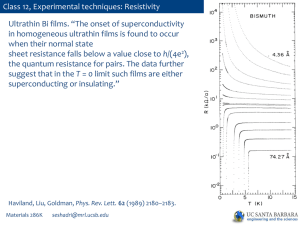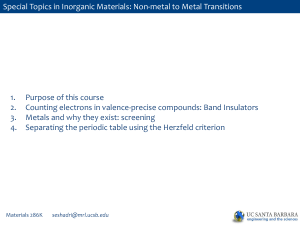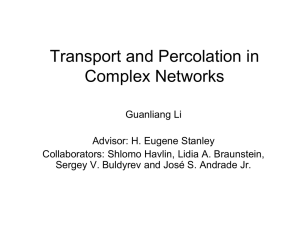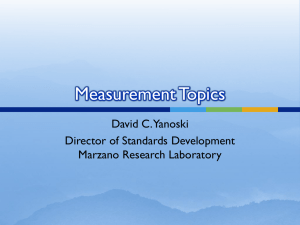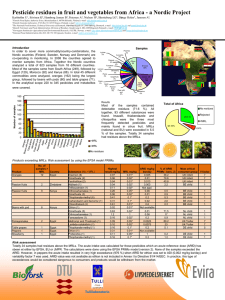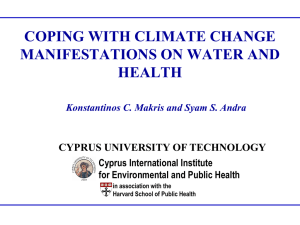PPTX
advertisement
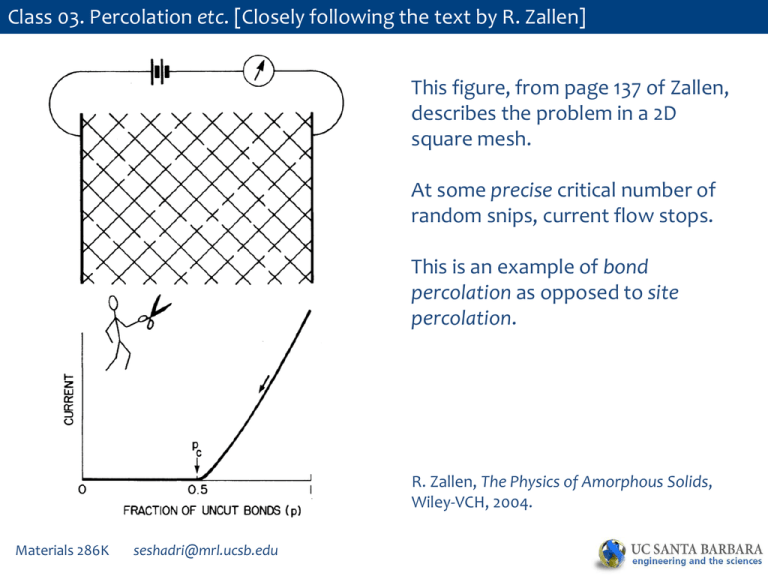
Class 03. Percolation etc. [Closely following the text by R. Zallen] This figure, from page 137 of Zallen, describes the problem in a 2D square mesh. At some precise critical number of random snips, current flow stops. This is an example of bond percolation as opposed to site percolation. R. Zallen, The Physics of Amorphous Solids, Wiley-VCH, 2004. Materials 286K seshadri@mrl.ucsb.edu Class 03. Percolation etc. [Closely following the text by R. Zallen] This figure is from page 143 of Zallen. This shows site percolation on a square lattice, with different site filling fractions p. For p = 0.75 in (c), the cluster formed by connecting neighboring atoms spans the whole lattice, and a percolation path is created. R. Zallen, The Physics of Amorphous Solids, Wiley-VCH, 2004. Materials 286K seshadri@mrl.ucsb.edu Class 03. Percolation etc. [Closely following the text by R. Zallen] This figure is from page 146 of Zallen. Computer simulations on a large square lattice; sav(p) is the average cluster size, and P(p) is the percolation probability. R. Zallen, The Physics of Amorphous Solids, Wiley-VCH, 2004. Materials 286K seshadri@mrl.ucsb.edu Class 03. Percolation etc. [Closely following the text by R. Zallen] Where is percolation applicable? This table is from page 148 of Zallen. R. Zallen, The Physics of Amorphous Solids, Wiley-VCH, 2004. Materials 286K seshadri@mrl.ucsb.edu Class 03. Percolation etc. [Closely following the text by R. Zallen] Different lattices: This table is from page 168 of Zallen. R. Zallen, The Physics of Amorphous Solids, Wiley-VCH, 2004. Materials 286K seshadri@mrl.ucsb.edu Class 03. Percolation etc. [Closely following the text by R. Zallen] This table is from page 168 of Zallen. R. Zallen, The Physics of Amorphous Solids, Wiley-VCH, 2004. Materials 286K seshadri@mrl.ucsb.edu Page 170 of Zallen. Class 03. Percolation etc. [Closely following the text by R. Zallen] This figure is from page 187 of Zallen. There is a simple scaling in 3D, between both the site and bond percolation thresholds, with the packing fraction and coordination number, and the percolation thresholds. R. Zallen, The Physics of Amorphous Solids, Wiley-VCH, 2004. Materials 286K seshadri@mrl.ucsb.edu Class 03. Percolation etc. [Closely following the text by R. Zallen] This figure is from page 243 of Zallen. The non-metal to metal transition on Si:P. 4pc is the dielectric sucseptibility. Note the similarity with percolation (the third slide in this set of slides). Measurements by Rosenbaum and others at 10 mK. R. Zallen, The Physics of Amorphous Solids, Wiley-VCH, 2004. Materials 286K seshadri@mrl.ucsb.edu Class 03. Percolation etc. [Closely following the text by R. Zallen] This figure is from page 244 of Zallen. Showing the percolation of hydrogenic wave-functions around the phosphorus donor atoms (much larger than the interatomic spacing). Since P substitution is random, this is a problem of percolation in a random close packing. R. Zallen, The Physics of Amorphous Solids, Wiley-VCH, 2004. Materials 286K seshadri@mrl.ucsb.edu Class 03. Percolation ? La1–xSrxCoO3 Wu, Leighton, Phys. Rev. B 67 (2003) 174408. Materials 286K seshadri@mrl.ucsb.edu Class 03. Percolation ? La1–xSrxCoO3 Wu, Leighton, Phys. Rev. B 67 (2003) 174408. Materials 286K seshadri@mrl.ucsb.edu Class 03. Anderson localization and the mobility edge This figure is from pages 229 and 232 of Zallen. The Mott and Anderson transitions represented graphically in 1D. R. Zallen, The Physics of Amorphous Solids, Wiley-VCH, 2004. Materials 286K seshadri@mrl.ucsb.edu Class 03. Anderson localization and the mobility edge This figure is from page 235 of Zallen. The notion of the mobility edge. R. Zallen, The Physics of Amorphous Solids, Wiley-VCH, 2004. Materials 286K seshadri@mrl.ucsb.edu
